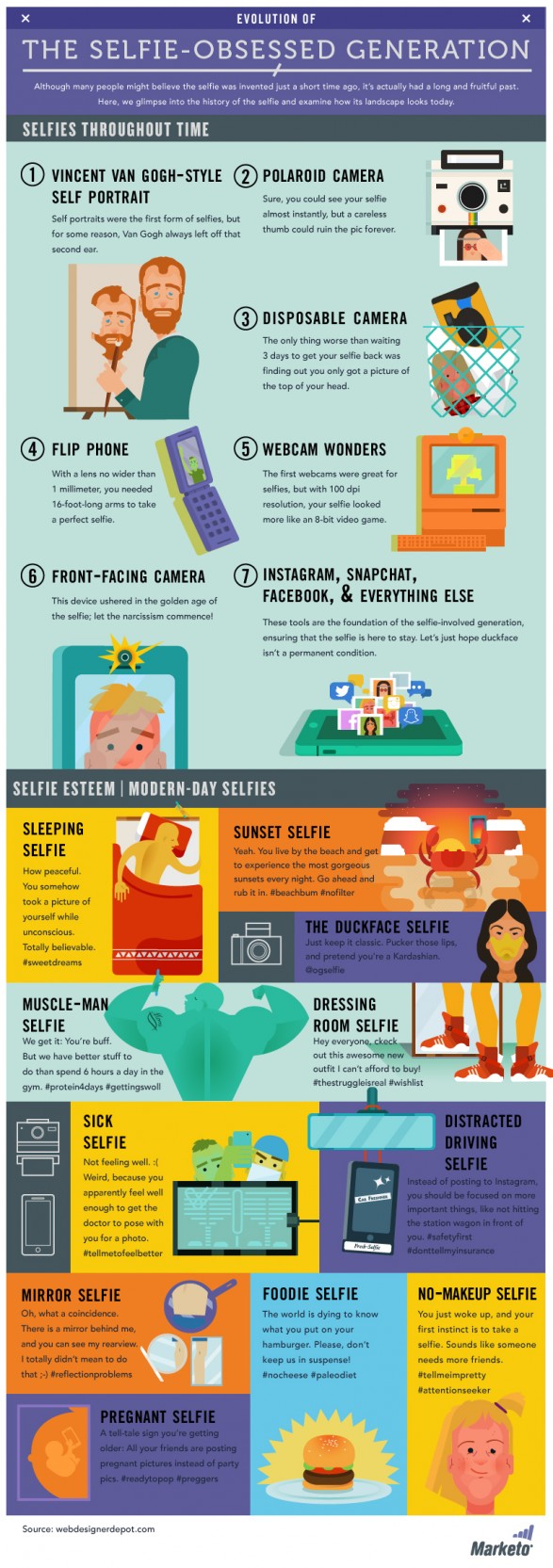I have a little test for you. It starts like this:
You’re preparing for a friend’s party, your hair is done, your makeup flawless and you’re looking pretty darn hot-to-trot in that new little black strapless thingy you purchased last week. How many of you would consider then and there to pull out your phone in the bathroom and take a selfie?
Yep, it’s a common sight on the internet- the bathroom selfie, goddess-features inundating the online newsfeed, glamorous and picturesque images of divine beauty, often all taken from the same flattering angle, sometimes with an added filter for artistic effect and a very modest, humble and almost self-hating caption like “Just a little prep for Justine’s tonight” or “My new black * brand-name * dress, pity my hair totally didn’t work out” or “All ready to hit the town with my favourite girls”.
It’s common enough. And most of us wouldn’t even think twice about seeing a selfie, taking a selfie, or commenting on a selfie. But here is my question: Would you take a picture of yourself, touch it up to ensure you look your best, print out 200+ copies and then hand then hand each print out to one of your friends, maybe even to thrust the images in their faces and frantically ask “Do you think this is pretty?”; “What do you think about this dress?”’ “I look way too fat don’t I?!”; “Please tell me I’m beautiful!”; “Why didn’t you say you liked my photo?”; “Do you think I’m prettier than Georgia’s picture?”.
We can laugh at the hilarity and absurdity of that setting, but do we not already do this on social media? We are encouraged and drawn into a culture so self-obsessed, so dependent on continual validation to maintain their sense of self-worth and esteem. It is unhealthy, it is gluttonous, vain and addicting. But it is our culture. It is our generation. We have normalised this form of shameless self-promotion, and creating a comparison culture, where every individual male and female is sexually objectified, judged by their appearance and blatantly and publically compared to others. The most frightful aspect of this new ‘selfie addiction’ however, is that youth are becoming dependent on it; dependent on the reactions given by their online peers and ‘friends’; dependent on the assurances that they are indeed beautiful or incredibly ‘ripped’ which in turn has become a defining quality in determining how ‘worthy’ you are as a person, and how valued you are in the community.
This focus on self-image and validation by online strangers is driving increasing insecurities in today’s teenagers and young adults. How can we possibly compete with the ‘beautiful’ images of people plastered online? How disgusting must we be, if all those pictures online are of ‘real’ people? We forget so easily of the technological manipulation, the staging and setting of the posted photos, and so often fall back into the mode of comparing our lowlights and flaws to everyone else’s highlight reels. It’s not hard to understand then, why body dysmorphia, depression, eating disorders and heightened insecurities leading to anxiety disorders are becoming so prevalent in young people today. Not only are we addicted to ‘selfies’ and becoming fixated upon the online response they receive, but we are further propagating our own sexual objectification and focusing the online community to unhealthy/unrealistic body image goals by the usage of certain ‘hashtags’ such as #nomakeupselfie, #bikinibabes, #blonde, #model, #thighgap.
“OK, selfies are a little vain, but everyone does them, and hey- they’re not that bad….”
Selfies are benign you say?
The reality is shocking. A recent article posted on Mirror News, told the story of Danny Bowman; a 19 year old who dropped out of school, didn’t leave his house in 6 months, and attempted suicide when he couldn’t take the perfect photo [1]. Danny is one of the few publicised cases of a very serious mental health problem brewing in today’s youth….selfie addiction leading to an internet-derived manifestation of body dysmorphic disorder (DSM IV). The story is astounding, with Danny admitting he would take up to 200 selfies a day, often spending about 3 minutes on each selfie, (~10hrs/day!) in his obsession to obtain the ideal image. The addiction stemmed from this ‘validation cycle’ when he was 15 and on Facebook. The article quotes Danny: “People would comment on them, but children can be cruel. One told me my nose was too big for my face and another picked on my skin. I started taking more and more to try to get the approval of my friends.” “I would be so high when someone wrote something nice but gutted when they wrote something unkind.” [1]
http://www.youtube.com/watch?v=X2wTpah9Wfc
Danny is an extreme case, with his addiction culminating in a suicide attempt; but as Dr David Veal – a psychiatrist who helped Danny recover – stated that selfie addiction “is (becoming) a serious problem. It’s not a vanity issue. It’s a mental health one which has an extremely high suicide rate” [1] and is becoming so widespread that is now recognized as a mental illness. The addiction preys on the insecurities and vulnerabilities of adolescents and young adults, who are developing a sense of identity and concept of self-worth. In fact, Dr Veal stated that “”Two out of three of all the patients who come to see (him) with Body Dysmorphic Disorder since the rise of camera phones have a compulsion to repeatedly take and post selfies on social media sites.” [2]
So how far does this selfie-craze have to go before we recognize something needs to be done? It is foolish to ask the internet population to cease taking selfies- it is unfortunately become an integral part of our culture and validation of self-esteem. What we need to encourage and begin proactively doing, is not participating in sexually objectifying selfies, to refrain from posting images of yourself online that have retouched, edited, or have simply been posted for attention and compliments. We do not wish to see your bedroom mess reflected in your wardrobe mirror, we’d rather see your new bikini’s on at the beach with a group of friends rather than in the dressing room of a shop; we definitely do not enjoy the photos of you looking pristine at the gym (surely I’m not the only one who looks disgusting and on the brink of respiratory collapse and exercise-induced anaphylaxis during exercise? Let alone having a hand too sweaty to even take a selfie?). It is not flattering, no matter how gorgeous you look, or how great your muscles look in the light, but bathroom selfies simply cry vanity and insecurity. Post your selfies, but ask yourself before you do, Why am I posting this? Am I celebrating an event? Am I announcing a new haircut? Or are you doing it for confirmation and reassurance of how ‘thin’ and pretty you are, or how toned and defined you’ve become? Are you secretly wishing to create envy? We are all guilty of it. But we do not do it out of sheer vanity, narcissism or egotism to begin with, we do it because we feel pressured to conform, to be approved of, or perhaps initially just to also show your new outfit, and share with your friends how glamorous you may be looking. Beware of when it takes hold, the addiction and the insecurities. You do not need the approval of online acquaintances. You are not defined by your appearance.
Body Dysmorphia Video
COMIC RELIEF
A hilarious blog on the ‘worst type of selfies’ – Can you relate?
A Funny look at “the 12 types of selfies” and “what they say about you”
References
[1]Aldridge G, Harden K. Selfie addict took TWO HUNDRED a day – and tried to kill himself when he couldn’t take perfect photo. [Online] 23 March 2014. 2014 Available from: http://www.mirror.co.uk/news/real-life-stories/selfie-addict-took-two-hundred-3273819 [Accessed 30 Mar 2014].
[2]Unknown. Selfies Linked to Narcissism, Addiction and Mental Illness. Disclose.tv, Weblog. [Online] Available from: http://www.disclose.tv/news/Selfies_Linked_to_Narcissism_Addiction_and_Mental_Illness/101410 [Accessed: 30 Mar 2014].














